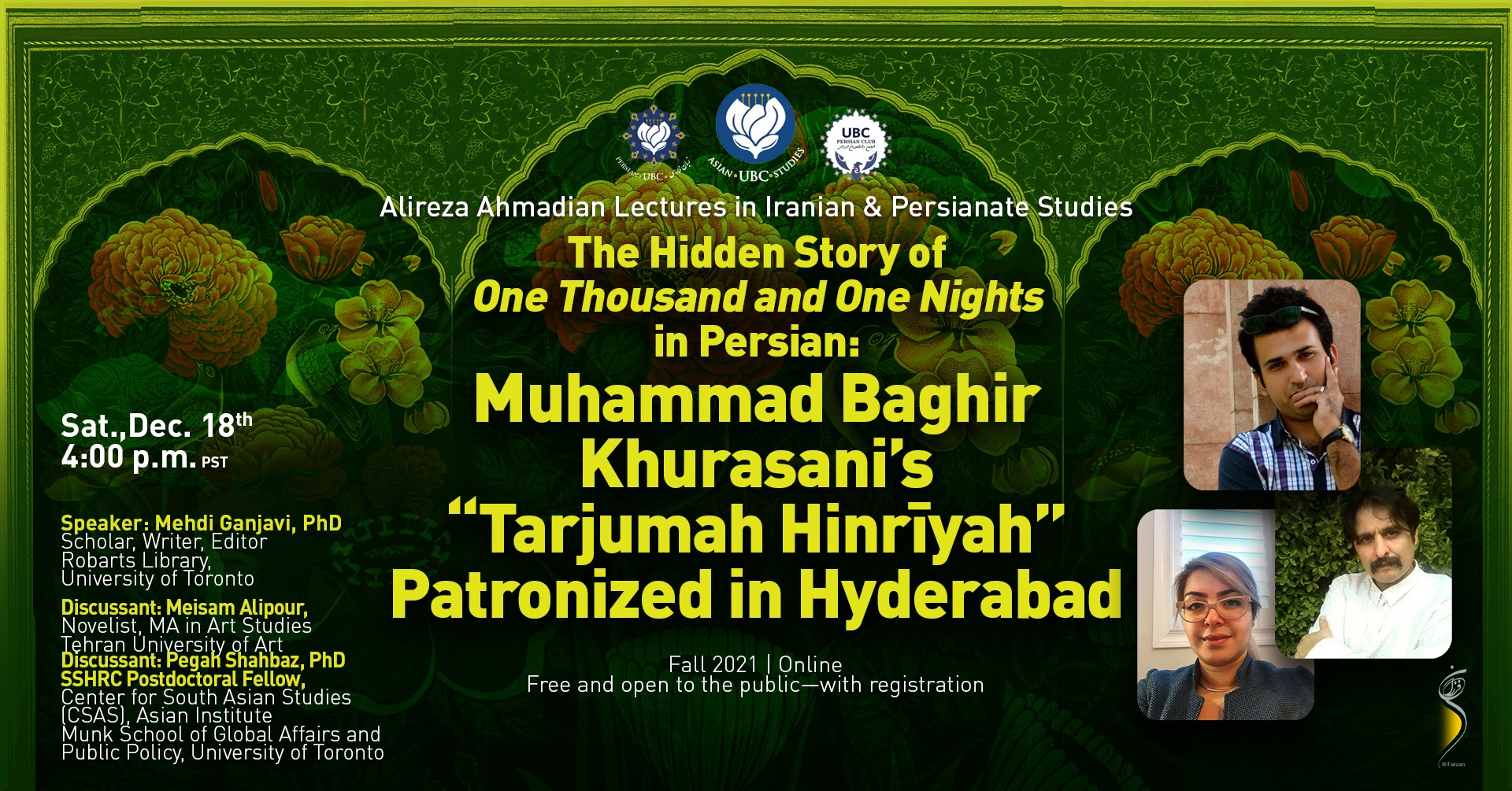

Poster design by Farzan Kermani
داستان پنهان هزار و یک شب در زبان فارسی: ترجمه هنریه محمدباقر خراسانی تحت حمایت مالی در حیدرآباد (هند)
سخنرانان: دکتر مهدی گنجوی، محقق، نویسنده و ویراستار، کتابخانه روبارتس، دانشگاه تورنتو؛ میثم علیپور، رماننویس و کارشناس ارشد مطالعات هنر، دانشگاه تهران
طرفبحث: دکتر پگاه شهباز، پژوهشگر پسادکتری، مرکز مطالعات جنوب آسیا، موسسه آسیایی، دانشکده امور جهانی و سیاست عمومی، دانشگاه تورنتو
در این ارائه، دکتر مهدی گنجوی اثر کمترشناختهشدهٔ ترجمهٔ هنریه، قدیمیترین ترجمهٔ هزار و یک شب به فارسی را بررسی میکند. محمدباقر خراسانی بزنجردی با حمایت هنری راسل، بارونت دوم (۱۷۸۳-۱۸۵۲)، وزیر مقیم بریتانیا در حیدرآباد، حدود سه دهه پیش از عبداللطیف تسوجی ترجمهٔ خود را در حوالی سال ۱۱۹۳ شمسی نهایی کرد. ترجمهٔ هنریه که کمتر مورد توجه مورخان ادبیات قرار گرفته است، نهتنها نخستین ترجمهٔ فارسی از هزار و یک شب است، بلکه بر اساس خانوادهای قدیمیتر (و بهطبع، معتبرتر) از نسخههای خطی عربی ألف ليلة وليلة است. سخنرانی حاضر به بررسی نسخهشناسانه، آرشیوی و تحلیل متنی دو نسخهٔ خطی موجود از این ترجمه میپردازد.
The event recording is now available:
In this presentation, Dr. Mehdi Ganjavi will historicize and explore the lesser known Henriyah Translation (tarjumah hinrīyah), the oldest translation of One Thousand and One Nights into Persian. Patronized by Henry Russell, 2nd Baronet (1783–1852), British resident in Hyderabad, Mohammad Baqir Khurasani Bazanjiri (b.1772) finalized his translation in 1814 almost three decades before Abdul Latif Tasuji embarked on a similar project in Iran. Overlooked by historians of literature, Henriyah Translation happens to be not only the earliest Persian translation, but one which is based on a significantly older (arguably authentic) family of Alf Layla Wa-Layla Arabic manuscripts. Through manuscript and archival study, and textual analysis of the two manuscripts available from this translation, this presentation will narrate an interregional story remained hidden for two centuries about Nights in Persian.
Guest Speaker:
Mehdi Ganjavi received his PhD from the department of Leadership, Higher and Adult Education at University of Toronto. His work focuses on the cultural Cold War, history of translation, print, publication and the politics of archive and historiography in contemporary Middle East. Ganjavi is a former PEN-CANADA writer-in-residence at George Brown College, and a graduate of Masters of Middle Eastern Civilizations (UofT). His scholarly writings have appeared in the Encyclopedia Iranica, Iranian Studies, and Review of the Middle East Studies. In the last seven years, Dr. Ganjavi edited, reintroduced, and oversaw the publication of seven little-known Persian novels from 1920s-1940s. These novels shed light on the origins of science fiction, detective fiction, historical and utopian fiction in Persian. He recently has finalized and submitted the first critical edition of “Henriyeh Translation”, the oldest Persian translation of “One Thousand and One Nights” (forthcoming with Maniahonar).
Meisam Alipour (novelist, scholar) is a graduate of Master of Art Studies from Tehran University of Art, and bachelor of Graphics Design from Enqelab Tehran University. His research focuses on modern Persian literature, Iranian painting, and Quran manuscripts during Abbasid era.
Discussant:
Pegah Shahbaz, PhD is a specialist of Persian literature of Iran, Central and South Asia. She is currently a SSHRC Postdoctoral Fellow at the University of Toronto, Munk School of Global Affairs and Public Policy – the Asian Institute, an Associate Member of the Centre d’Études et de Recherches sur l’Inde, l’Asie du Sud et sa Diaspora (CERIAS) at The Université du Québec à Montréal (UQAM) and the Section Editor of the Fables and Tales Chapter of Perso-Indica Project. She works on questions of narratology, women and gender studies, translation and systems of knowledge transmission in the Persianate World, in particular the reception and domestication of Indian religious and cultural heritage in Persianate literary culture.
Should you have any questions, please contact the Department of Asian Studies at Asian.Studies@ubc.ca.